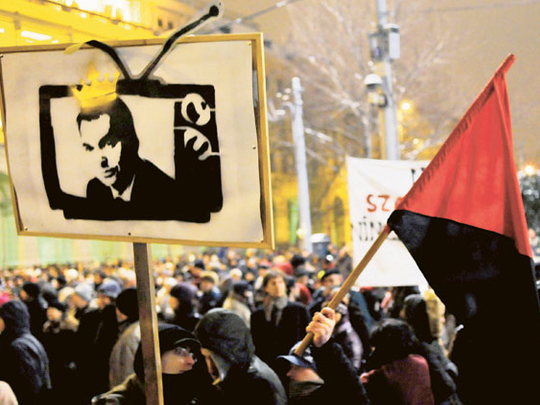
The controversial media law in Hungary — which is at present holding the rotating presidency of the European Union for the first half of 2011 — is drawing opprobrium in the international community, particularly from fellow EU members France, Britain and Germany.
Unhappy with the turn of events in the country, the EU delivered an ultimatum to the country to show that its new media law either complies with EU rules or faces legal action. On January 22, European Commission spokesperson Jonathan Todd said: "I confirm Hungary has two weeks to respond, then we reserve the right to launch infringement proceedings."
Speaking to Weekend Review at the Hungarian parliament recently, Member of Parliament László Horváth, who belongs to the Fidesz party, defended the law, saying: "The media in Hungary needs to be regulated." But he said that his party is willing to amend the law to make it conform to EU standards.
However, Peter Bajomi-Lazar, a senior research fellow at the University of Oxford, fears the EU has not contested some of the potentially most dangerous provisions of the "Media Constitution" and the Media Law — namely those that stipulate that "[t]he media content may not offend or discriminate against — whether expressedly or by implication — persons, nations, communities, national, ethnic, linguistic and other minorities or any majority as well as any church or religious groups" (Article 17 of the Media Constitution).
"Under the pressure of the EU, the Hungarian government may change some of the contested provisions of the laws just to save face but may not change the truly harmful ones," he says.
Some Hungarians feel that the law is an attempt by the centre-right government headed by Prime Minister Viktor Orbán, 48, to consolidate its domestic power base following the Fidesz party's emphatic win in the April 2010 elections. "The problem is that there is no real opposition in the party itself," says a Hungarian man speaking on the condition of anonymity due to safety concerns. "Whatever Orbán wants gets done. Already many people are referring to him as Viktor the First [implying that he is the king]."
"The source of concern is that … NMHH has the authority to interpret the law and decide what constitutes "public interest", "common morality" and other vague concepts in the law, resulting in restriction of media freedom," says Barbora Cernusakova, a researcher on Amnesty International's Europe and Central Asia Programme.
Apart from the fact that this law will restrict freedom of the press, there is apprehension about the political independence of the National Media and Communications Authority as five of its board members were appointed by Fidesz without any consultation. There have been concerns in some quarters that journalists and editors may be forced to exercise self-censorship to avoid penalisation.
"During my professional experience, [which] started 20 years ago, I never exercised self-censorship and I won't review my position on this," says András Dési, a senior editor and reporter at the Népszabadság, the country's leading newspaper.
Putting things in perspective
Freedom of the press is a must for any democracy to thrive but the furore over the new law and the government's need to control the media has to be put in perspective, considering that the Hungarian media is not particularly known for uncovering scandals or exposés. Ordinary citizens are more concerned about rising gasoline prices, unemployment and the fluctuating rate of the Forint.
"You are absolutely right," Bajomi-Lazar agrees. "The new laws have nothing to do with investigative journalism. Hungary has a tradition of opinion journalism with many in the journalism community considering themselves public intellectuals and associating themselves with various causes, ideologies and even political parties, and publishing rather critical views [and news] about the government. What the government wants to put an end to is this kind of critical journalism."
Dési echoes this sentiment. "Journalists and the media are to control the politicians and politics. With respect to Hungarian history of the 20th century, it's more than a moral experience to be remembered," he says.
Placing limits on news coverage is worrying but what is more frightening about the new law is that the government is muzzling the voice of the opposition.
"Public service television is now headed by Fidesz loyalists with the result that more than 80 per cent of its major evening-news bulletin is devoted to speakers of Fidesz, with the opposition barely having an opportunity to have their voices heard," Bajomi-Lazar says.
Opposition politician Ildiko Lendvai, who heads the Hungarian Socialist Party, or MSZP, told Germany's Deutsche Welle last year: "The purpose of this law is to change the public media into the party media."
If the voice of dissent is silenced, it does not take long for propaganda and politics to turn a democracy into a dictatorship. As American journalist and author Sydney J. Harris once said: "Democracy is the only system that persists in asking the powers that be whether they are the powers that ought to be."
The new gag on press
The Law on Media and the Freedom of Press, which came into effect on January 1, imposes restrictions on all media content, broadcast, print or web-based, regardless of whether it is public or privately owned. The government has set up a new media authority, granting it absolute power to enforce loosely defined standards. The newly created National Media and Communications Authority (NMHH) will have the power to impose heavy fines, ranging from ¤35,000 (Dh176,352) for periodicals to ¤730,000 for broadcast media, for content it deems runs counter to "public interest" and "national order". It can also impose fines for unbalanced news coverage. The NMHH has also been empowered with the right to shut down news organisations.
The writer's visit to Budapest was organised by Qatar Airways.











